AI-Powered Strategy in Games: How Reinforcement Learning is Revolutionising Decision-Making
One of the key breakthroughs in AI has been the idea of reinforcement learning.
Reinforcement learning represents a paradigm shift in strategic decision-making. Unlike traditional analytical approaches that rely on predetermined rules, RL systems develop strategies by maximising rewards through continuous experimentation. This approach has produced remarkable breakthroughs, most famously with DeepMind's AlphaGo defeating world champion Lee Sedol in the ancient game of Go—a feat previously thought to be decades away.
Source
What makes RL particularly valuable for leadership is its ability to:
Discover novel solutions beyond conventional thinking
Adapt dynamically to changing conditions
Optimise for long-term outcomes rather than immediate gains
Handle complex environments with numerous variables
Let’s delve deeper into how reinforcement learning contributes to strategy development and its broader implications.
How Reinforcement Learning Works in Strategy
Reinforcement learning operates on the principle of agents interacting with an environment to maximise cumulative rewards over time.
The key components are:
Agent: The decision-maker (e.g., AlphaGo in the game of Go).
Environment: The system or scenario in which the agent operates (e.g., a game board, a simulated battlefield, or a financial market).
Actions: Choices the agent can make at each step.
Rewards: Feedback signals that guide the agent toward desirable outcomes.
Policy: A strategy that defines the agent's actions in various states.
Through repeated interactions, the RL agent learns to associate specific actions with long-term rewards, refining its strategy iteratively. This process enables the agent to adapt dynamically, even in highly complex or uncertain environments.
Strategic Applications for Today's Leaders
Business Strategy Optimisation
Forward-thinking executives are implementing RL to enhance core business functions. Major retailers use reinforcement learning algorithms to optimise pricing strategies, resulting in revenue increases of 5-15% while maintaining customer satisfaction. These systems continuously learn from market responses, adjusting prices dynamically based on demand patterns, competitor actions, and inventory levels.
In supply chain management, companies like Amazon employ RL to predict demand fluctuations and optimise inventory positioning across distribution networks. This approach has reduced logistics costs by up to 12% while improving delivery times.
Financial Decision-Making
Investment firms increasingly rely on RL for portfolio management and risk assessment. JP Morgan's LOXM system uses reinforcement learning to execute trades at optimal prices with minimal market impact. The technology analyses market conditions in real-time, identifying the most favourable execution strategies based on historical patterns and current market dynamics.
Product Development and Innovation
Leading technology companies employ RL to accelerate product development cycles. Microsoft uses reinforcement learning to optimise software testing procedures, reducing testing time by up to 30% while increasing bug detection rates. The system learns which test scenarios are most likely to reveal defects, allowing development teams to focus their efforts more efficiently.
Implementation Considerations for Leaders
While reinforcement learning offers tremendous potential, successful implementation requires careful planning:
While reinforcement learning offers tremendous potential, successful implementation requires careful planning:
Start with well-defined problems: The most successful RL applications begin with clearly articulated strategic objectives and measurable outcomes.
Invest in data infrastructure: Effective reinforcement learning depends on robust data collection systems that capture relevant environmental feedback.
Balance exploration and exploitation: Leaders must create organisational cultures that support both exploitation of known strategies and exploration of new approaches.
Develop cross-functional expertise: Building effective RL systems requires collaboration between domain experts who understand the business context and technical specialists who can implement the algorithms.
The Future of Strategic Leadership
As reinforcement learning continues to mature, we can expect increasingly sophisticated applications across industries. The most forward-thinking leaders are already exploring multi-agent reinforcement learning systems that simulate complex competitive environments, allowing teams to test strategic hypotheses before committing resources.
The competitive advantage will increasingly belong to organisations that can effectively harness these technologies to augment human decision-making. Leaders who understand both the capabilities and limitations of reinforcement learning will be best positioned to navigate an increasingly complex and rapidly changing business landscape.
By embracing reinforcement learning as a strategic tool, today's leaders can discover innovative approaches to persistent challenges, optimise resource allocation, and build more adaptable organisations prepared for whatever the future holds.


